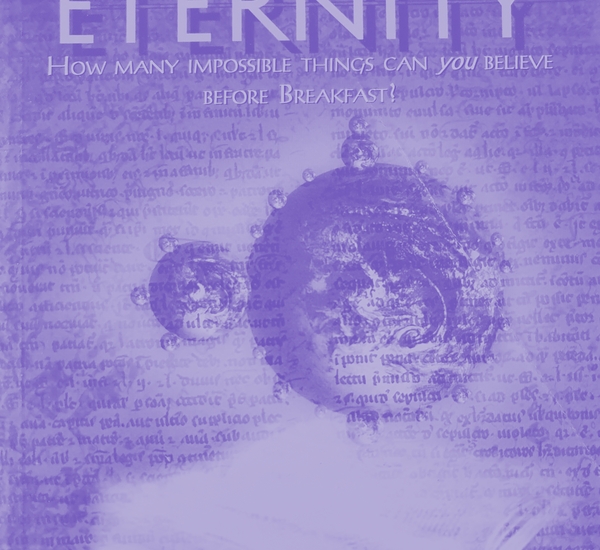The Motivation
I wish I could say my motivation for writing short stories for three Doctor Who charity anthologies in 1999 was because I deeply supported the causes. But my views on cat neutering in Cincinnati are strangely ambivalent, and to be honest at the time I was thinking about trying to get more people to read Back From the Dead: one of the stories published featured Ace’s cat from BFD (who fortunately shared a name with the Doctor’s cat from the New Adventures), and the first thing I pitched for Walking in Eternity was an epilogue to the series.
But the Doctor Who charity anthologies were also something of a tradition, with established and fan authors alike contributing. The idea of seeing my name in the same book as some of the writers I’d become such a fan of was more than a little in my mind, and was the validation of having something published a little more professionally than on the internet.
Inspiration
The inspiration for the stories were, for the most part, other things I’d seen or read: Territorial Markings was inspired by the Exiles issue of Neil Gaiman’s Sandman, and What Guns Do was a Doctor Who Fight Club. Only The Puppet King required more thought, because the theme of the collection was more restrictive: the editors were looking for stories that filled in the gaps in Doctor Who continuity, and so I had to specifically go looking for a gap. Perhaps because of this extra work and originality, The Puppet King is my favourite of these three.
The Pitch
With each of the collections, the editors were happy to receive final stories rather than pitches. This meant that you did the work without any guarantee of seeing it in print, but I have always found I’m better at writing stories than synopses. If a word count is low enough, I still sometimes prefer to pitch a finished story rather than risk my synopsis not having the right impact.
The only exception to that was Walking in Eternity, where I emailed editor Jay Eales my idea for a story beforehand, for some reason. I didn’t hear back from him, and realised that he wasn’t very impressed with it. Which led me to send him a polite email saying pretty much “You didn’t like that, did you?”. He confirmed that he didn’t, and I ended up quickly writing the Doctor Who Fight Club story and sending it in as an alternative.
I don’t remember the initial pitch that Dale sent for WinE, but his comments about firing off a second one at short notice that I was much more excited about does ring a few bells for me. That I rejected his first pitch is no reflection on Dale, more the seat of my pants approach to the project I was taking.
This he did like, and I made it into the final book.
Editorial
At the time I wrote my stories, I had a view of what an editor should be. I expected them to do a lot of work on the story, make suggestions for things that could be improved or ideas that I might want to incorporate to make the story better. But none of the editors of the charity anthologies worked that way.
I’ve always been a light touch editor, relying more on instinct than formal training. I know what I like, even if I don’t know why I like it. I trust my collaborators to deliver the goods, and who would fit well in a given project. I copy-edit to within an inch of a story’s life, but unless I find a plot problem, I generally trust in the writer’s judgement. Why commission someone if you’re going to demand wholesale changes to fit your own vision? I’m an editor, not a co-writer.
It didn’t dent my expectation that none of the editors I’d worked with worked the way I wanted them to: everything I sent off and got accepted in the subsequent years was always with the expectation that I would discover a patron. Someone who would teach me the tricks and the secrets to becoming a good writer. Someone who would take all the pain out of writing by just letting me write whatever came to mind, and then spending all their time making it better without me having to worry.
I know exactly where this idea of editors came from: it was a product of my imposter syndrome.
I knew - knew - I wasn’t a good enough writer to ever make a living at it. I knew that under my own steam, I wouldn’t ever be able to learn how to do it properly. So instead of trying, I let this fantasy of an editor’s role grow. If that was how an editor worked, then one day I might end up writing for one: from that moment on they would make me better and keep giving me work. I wouldn’t have to keep trying to find new places for my work, and keep getting knocked back. Hell, I could even go full time, because they would always want to accept everything I wrote, once they told me how to make it good.
If there’s one message you come away from this site with, it should be that you have to take responsibility for your own work. The only person who is ever going to make it better for you, is you.
What Happened Next?
All three anthologies came out within 6 months of each other, and I remember being disappointed that I hadn’t managed to write anything for one other collection that came out at the same time: the bragging rights of being in all four books published that year appealed to me, but in truth I didn’t even submit to the fourth. By the time my three stories were published, Heritage had been announced and I was busy doing the final rewriting.
The anthologies themselves were received well … Missing Pieces in particular probably marked the high-water mark for the charity anthologies. There were few reviews, and even fewer that mentioned my stories, but one co-editor of Missing Pieces did comment that my story was his personal favourite, and that made me happy. However celebrity fan Ian Mond also mentioned that he didn’t like it all, so it all balanced out.
I don’t think that any of the charity stories influenced anyone to buy any of my books, or hire me to write them. However, the timing was extremely fortunate, and I don’t think that having my name appear in a number of places around the time that my first Doctor Who book was published did me any harm at all. And, in the case of Missing Pieces, it started a relationship with an editor who I’ve since worked with on a number of occasions.
There are certain writers I will always invite to pitch, because I know that they’ll come up with something entertaining and unpredictable. Off the top of my head: Simon Bucher-Jones, Kelly Hale, Alan Taylor, Philip Purser-Hallard, Sarah Hadley, Jonathan Dennis, Paul Magrs, Mags L Halliday and Dale Smith is definitely on that list. Any of my anthologies that don’t feature any of these names, it’s because they were busy, or not interested at the time.
And when the situation was reversed and Jay wrote a short story for the collection I was editing, I found myself learning from the example he had given me. I learned why I’d never met the kind of editor I used to dream of: because as an editor it’s far better to step back and trust your writers to get the job done their way. If you’re telling a writer how they should write their story, then you’re doing it wrong.


